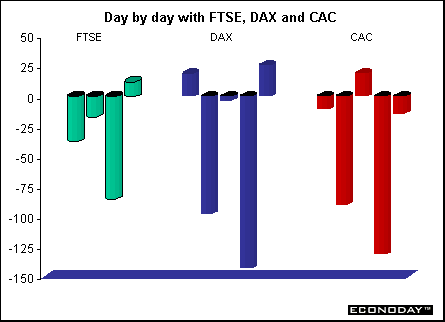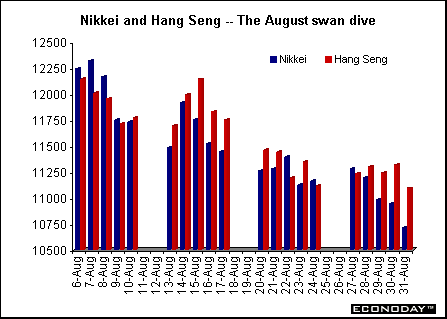
Europe and Britain
European and British stock markets ended a depressing week in a marginally brighter mood as U.S. markets steadied ahead of Labor Day weekend. The pain continued in the telecommunications sector on both the Frankfurt DAX and Paris CAC. For the fourth day in succession, British equities continued to follow the ups and downs in the United States. On Friday, the initial tone in New York was positive allowing the FTSE to stage a modest rally. The catalyst for the rally was some more encouraging economic news, notably the Chicago purchasing managers' index and U.S. factory orders. The data raised hope that the worst might be over for the U.S. manufacturing sector.

Asia
The Nikkei again plunged to its lowest closing level in 17 years, this time after the country's financial regulator said it might take twice as long as the government expects to reduce bad debts in the banking sector. The Nikkei 225 closed below the psychologically important 11,000 level on the week. The remarks by Financial Services Minister Hakuo Yanagisawa overshadowed a government plan to stimulate the stock market by cutting the capital gains tax on share trading.

The bad news on the banking sector came on the heels of a 5 percent national unemployment rate, the highest level since records began after World War II. The consumer price index also continued to fall unabated. The tax cut on stock deals is aimed at encouraging small investors to take their savings out of the bank and invest in the market to stimulate the economy. Prime Minister Junichiro Koizumi is desperate to get Japanese consumers investing and spending, but they resolutely refuse to do so as job insecurity grows. Japan's banks are burdened with the bad debt of previous attempts to stimulate the economy, which have covered Japan with under-used bridges, ports and airports.


Introduction • Global Stock Market Indexes • Recap of Global Markets • Currencies • Indicator Scoreboard

The Bottom Line • Looking Ahead
|